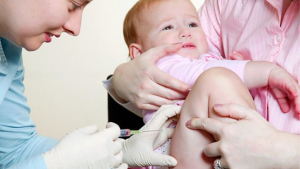Recently, particularly in Europe, there has been an outbreak of measles: the highly contagious virus that can be deadly to young children. The countries in Europe with the highest number of cases are Ukraine, Serbia, Israel and France.
 This outbreak is linked to the anti-vaccine movement: a large group of people who are refusing to vaccinate their children or be vaccinated themselves because they believe that the vaccine causes Autism.
This outbreak is linked to the anti-vaccine movement: a large group of people who are refusing to vaccinate their children or be vaccinated themselves because they believe that the vaccine causes Autism.
Before the vaccination was introduced to the public in 1988, measles was deadly. As more people don’t get immunised, it seems the virus is becoming more scary again.
The measles hasn’t just infected Europe, either – there have been high numbers of measles cases in the US states of Washington and New York. A lot of people who live in the Philippines refuse to have the vaccine, so far the virus has claimed 130 lives. It has also hit Japan, who are now fighting the worst measles outbreak in a decade.
Why are people against the vaccination?
Much of it comes down to social media. Many people read that the vaccination is harmful on sites such as Facebook, Twitter and Instagram, believe it and spread the word. Others are against it for religious reasons.
If someone who is against the vaccine has a child, they will likely not get them vaccinated against the measles. As the measles is incredibly infectious – it can spread to someone else within 15 minutes – if this child who hasn’t been protected catches the disease and comes into contact with a baby under a year old, this puts the younger population at risk.
Also, some adults who didn’t get the vaccination as a child have travelled to countries in Europe unaware of measles, brought it back to their countries and spread it.
Since 2000, it is estimated that the measles vaccination has saved over 21 million lives.
If this continues, the infection will become more of a public health threat.
Will there be a measles epidemic?
By Izzy, Year 7

